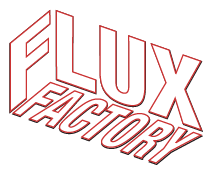 Flux Factory’s Mission
Flux Factory’s Mission
Flux Factory’s mission is to support emerging artists through Artist-in-Residencies and Exhibitions, education and collaborative opportunities. Flux is an artist-led space that builds sustainable communities and retains creative vitality in NYC. Since 1994 Flux has hosted over 300 Artists-in-Residence, both local and international, as well as staging over 700 exhibitions across all disciplines. Flux’s home in Long Island City is a creative hive that incubates experimentation with collaborative processes. Flux hosts over 75 annual multidisciplinary events; all are free to the public while all participating artists are compensated. Each year Flux selects 40 Artists-in-Residence to develop their creative practices by offering affordable studios, shared workspaces (such as a print shop, wood shop, and technical office), a solo exhibition, as well as professional development opportunities. Flux commissions 100 multidisciplinary artworks annually through open calls with 4 annual Group Exhibitions.
Nearly 30 Years of Community Building
In 1994, 7 artists rented a former spice factory on the desolate Williamsburg waterfront with no walls, source of water or HVAC. This place of humble beginnings quickly grew into a notorious arts destination as an alternative to the commercial gallery scene. Flux became a 501c3 nonprofit in 1999. In 2002 Flux was priced out and moved to 43rd St in Sunnyside, Queens. That year Flux formalized the Flux Major Group Exhibition program which currently produces 4 group exhibitions annually. In 2009 Flux was displaced through eminent domain and moved to its current location at 39-31 29th in Long Island City. This move was an impetus to professionalize a formal Residency, which now serves 40 artists annually.
In 2021 Flux Factory announced that it had purchased two spaces, having finally achieved permanent sustainability through funding from the City of New York. Flux’s home-base on 29th Street was acquired to deepen the quality and longevity of Flux’s Artist-in-Residency. Flux is also launching a new venue, called “Flux IV” (the fourth space Flux has operated), in mid-2022 located on the Hunters Point South waterfront.
As a grassroots art collective that has slowly grown its outsized impact, Flux’s primary focus is on emerging in-need creatives who have a socially engaged art practice, an interest in building community, and experience working collectively. Flux Factory’s 9000 sq ft main building, located in Long Island City, has 16 private studios, 8 common workspaces for art production and a 1400 sq ft gallery, where residents develop free exhibitions and public programs with roughly 7000 attending annually.
In 2016 Flux co-founded the Windmill Community Garden, a park across the street at which Flux organizes public events with local partners. In 2020 Flux formalized the Rhizome Project, an antiracist initiative to give intentional space to Black voices through exhibitions, fellowships and organizational approach. In 2021 Flux helped to launch the Nexus Fridge, a cooperatively-led free fridge in front of Flux’s building to distribute free food and essentials. In 2017 Flux formalized its Satellite Projects program to send Residents to partner institutions abroad annually; in 2021 alone, Flux sent 40 American artists to projects at Denmark’s ARoS Museum and Budapest’s AQB Residency; and in 2021 Flux piloted its first annual Residency on Governors Island, serving 25 artists with free studio space for the Summer and Fall.
Territorial acknowledgment and statement of commitment
As a building and community, Flux Factory sits within Lenapehoking, or “The Land of the Lenape”. This is the traditional territory of the Lenni-Lenape people; the Canarsie, Munsee, Matinecock, Maspeth and Rockaway Nations. We extend our gratitude to the people of each of these nations and acknowledge their love, labor, lives and stewardship of the land that we, Flux Factory, now occupy. We commit to standing in solidarity with the Lenni-Lenape people and all Indigenous Nations in their ongoing struggle against Settler Colonialism. We recognize that New York City exists on unceded land.
